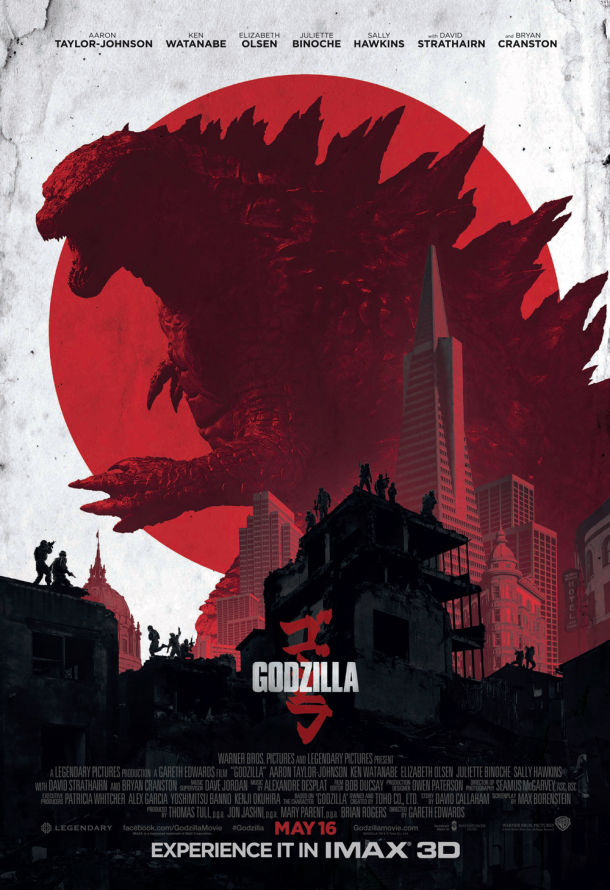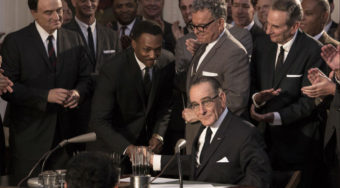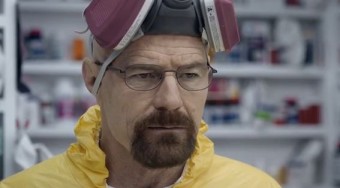Interviews
'Godzilla' Director Gareth Edwards

This Thursday, troche I had the opportunity to interview Gareth Edwards, treat the director of the new movie Godzilla. Edwards was kind enough to talk to five other reporters and I about the military’s involvement in his new science fiction drama, the real events he was inspired by and why he thinks making a movie is a lot like giving birth.
Check out a slightly edited transcript of the interview below.
Lauren Bradshaw, Cloture Club: We heard you got to go to the Pentagon today. How was that?
Gareth Edwards: We did have that. That was the one thing we got because they were like… the Department of Defense cooperated on this film, so we had a military advisor the whole time and we had a lot of access to aircraft carriers and soldiers. A lot of the people in the movie were real soldiers.
Kyle Osborne, EntertainmentorDie.com: I think you did right by them. A lot of the time, they are the bumbling idiots of the film…
Gareth Edwards: Yeah, thanks. I don’t know, it’s tricky with a film like this because you can’t… you’re trying to create a problem that takes two hours to solve or else you haven’t got a movie. In trying to create a problem, you need conflict; you need things to go wrong. So, you don’t want to make anyone look stupid and the military have been fantastic. David Strathairn plays an Admiral in our movie and what’s great is that from day one, what was clear is the common assumption about these sort of things. I haven’t got a military background at all, but they were very keen to get the military portrayed as peacekeepers and trying to save lives. Kind of the opposite to the way they are normally portrayed in movies. David was also very much policing that in all of the scenes he was in so it was kind of easy in that sense.
Lauren Bradshaw, Cloture Club: On that note, one of my favorite scenes from a movie in a very long time has been the skydiving scene. To be honest, I think it is one of my favorite scenes from any movie. I was just wondering how you thought about that. I know the Golden Knights do jumps like that. Did you get any inspiration from that?
Gareth Edwards: Cheers! I’m not sure where it fully came from. It was just a case of… in the screenplay, it said they jump out of a plane and there’s a version of the scene that could be really cheesy. I was so desperate; out of all of the scenes in the film, it was the one where I was like ‘Okay, we’ve got to do this seriously. This has got to be a moment in the movie.” I was walking around – it was in Santa Monica whilst we were preparing the film – I was walking around at night and I put my phone on that had all of these different songs. It accidentally went to the music from 2001: A Space Odyssey, which is all of that kind of choral, harrowing, chilling music.
It gave me chills and I was pretending to look up and see these guys falling from the sky. Because they’re so small, and they’re little pinpricks of light that look like stars, I was paranoid that you wouldn’t know where they were. So, I pictured them with their trails. What’s funny is, we showed the film, or parts of the film, to the Secretary of the Navy and I sort of apologized for taking a bit of liberty with the smoke trails and he said, “Hang on a minute.” He got his phone out and showed me this clip. It’s him skydiving with some special forces guys and they’re all wearing the smoke trials. He was like, “Yeah, it can happen because in theory, as a visual, you can see where people landed.” So it made me feel better. But really, it was because it looked cool.
Adam Bellotto, Perihelion Science Fiction magazine: With the Department of Defense, did they contribute specific things for the movie, or was it more of an advisory role?
Gareth Edwards: Both! There’s obviously a lot of things that we film. Hopefully you can’t tell the difference from when we built a set and when we used a real ship. Sometimes we had access to an aircraft carrier. It’s not actually in the movie, but we went to a real Homecoming in Hawaii where [the military members] reunite. A lot of the soldiers in the movie were real soldiers. I think it’s considered some sort of training exercise, when it’s appropriate, that they can be a part of the film. It’s amazing because we have, obviously, the military guys and ex-military guys that are moving these people around and they’re the best in the world. You have 300 extras on the set, and it can take hours to get them to do something right. But, you put a military guy in there and it happens within ten minutes. They’ve got so much experience at telling a whole group of people what to do quickly and get it right. If I was in the military, I think when I retired I would get a job as an assistant director because you’ve got all the skill sets for it. You’re going to go very far, I think.
Asawin Suebsaeng, MotherJones.com: Going off the military stuff, I read how a lot of the imagery in the film was directly inspired by things like the tsunami, Hurricane Katrina, Fukushima. Looking at a lot of the movie, I was reminded of images from Beirut in the 1980s. Can you tell us if there was any wartime, or Iraq war influence in the imagery you were doing in terms of the destruction of the cities? Because, for example, the main character comes back from Iraq or Afghanistan…
Gareth Edwards: Right, yeah. I think when you sit down on day one with all of the different heads of department and you say, “Okay, let’s take this seriously. Let’s do this realistically.” There’s never really going to be giant monsters that come out of the ocean and smash a city and cause a tsunami and things like this. But there are events that smash cities and cause tsunamis, within nature and war, and so you don’t have to think very hard to recall that imagery. It’s so scarred in our minds that as we are creating the movie, we are getting all of those reference images and it’s nearly impossible not to be influenced by them. Also, in a weird way, what you’re trying to do subconsciously is remind the audience that as absurd as everything happening is, this stuff does happen. It’s a fantasy but I think all good fantasy has something truthful or real about it, at least below the surface.
When the events in Fukushima happened, we were writing the screenplay and we already had the film set in Japan about nuclear power and the problems with that because that’s always been the case with Godzilla, especially the original. We had a choice, which was do we not make the film about Japan? Do we not make it about nuclear anything? We spoke to our partners on the film and they said basically the original Godzilla, the first one, was a metaphor for Hiroshima and that there are some important questions that to some extent… You have a golden opportunity with such a popular culture movie to raise some of these questions. Like, we’ve opened this Pandora’s Box with nuclear power. We like to think we can control this stuff and it’s completely safe, but the reality is that things go wrong, and when they do, you can’t put it back in the box. So our movie is kind of, if anything, about… we don’t control nature, nature controls us and we need to accept that and not be so arrogant because it’s something that… I don’t know, we are going to keep finding ourselves in this problem if we believe that everything is within our control and nothing can ever go wrong.
John Hanlon, JohnHanlonReviews.com: Can you talk about your first experience with Godzilla the character, like the first Godzilla movie you saw or what you felt?
Gareth Edwards: The first experience ever was with a cartoon. I’m not sure if it was big over here, but in the UK it was the Hanna-Barbera cartoon Godzilla. It had this silly little baby Godzilla called Godzuki. So that’s what everyone in the UK, at my age at least, that’s what they all remember…to the point where, when I got this gig, they – In Britain, no one likes to say anything nice about anybody – so my friends would mock me by referring to the film always as Godzuki to the point where my phone learnt the spelling more than it learnt Godzilla.
Lauren Bradshaw, Cloture Club: The autocorrect?
Gareth Edwards: Yeah so I’d send e-mails to the studio about Godzuki and scenes with Godzuki by accident. It was just autocorrecting everything. For a while I thought, ‘Oh no, they are going to think they got the wrong guy.” Steven Spielberg is going to get a call any day now.
John Hanlon, JohnHanlonReviews.com: Did you end up going back to see all of the Godzilla movies?
Gareth Edwards: Yeah. They’re actually really hard to get hold of. There’s not a one-stop shop. They’re all different distributors, all different little box sets that overlap and different regions. Yeah, I did complete my collection. Monsters, the film I did before this, I was promoting in Australia. I had just learned I got this gig and hadn’t told anybody. I was told no one could know. So whilst I was killing half an hour, I went across the street and there was this comic shop. I looked around it and they had all of the Godzilla movies that I didn’t have. I had no money really, so I kinda used the last of my money, and I was in debt at the time because when you’ve made a low-budget film… and I bought all of these movies.
I was really proud of myself but I thought, ‘I’ve got to keep this a secret because no one is supposed to know.” Like as if anyone was really going to look at that and go, “Hey are you directing Godzilla?” I just sort of thought it was written all over my face. You know, he’s going to ask me any minute, “Are you directing Godzilla?” Then I went back to the distributors and sat there. As I was waiting for the first interview, I looked across and all of those same DVDs were on their self. I was like, “How come you’ve got…” and they were like, “Oh we distribute them. Do you want them? You can just have them. We’ve got loads!”
Mary Wright, American University The Eagle Newspaper: Was there something that you’ve never seen in a Godzilla movie that you wanted in your own?
Gareth Edwards: Yeah, I think that… I feel like it’s such an amazing icon and character and the way that they’re made especially after a [few of them] in Japan. You can’t take those films and play them to your Mom or play them to your girlfriend and expect them to like them because it’s just the tone and the approach. Yet, there are movies I grew up with whether it be Close Encounters or Jaws or Alien or whatever… which pull anybody in. They’re universal in the way that they appeal to people and so there’s this feeling of like ‘let’s do that but with Godzilla. Let’s go make that type of movie that we grew up with.’ The ones that really worked but you’ve got Godzilla in it.
So ,when we were filming, Thomas Tull, he’s the producer of the movie, his favorite movie is Jaws; and mine— I’ve got loads of them like Close Encounters being an inspiration for me– and so we’re always referencing that sort of style of filmmaking. The ones where, before they had digital technology, they couldn’t show it [the monster] all the time and as a result, it was more powerful and it draws you in more slowly and the anticipation gets more and more intense and so we were harkening back to that style of filmmaking. But, within the world of Godzilla, obviously, we have to show him. You’re gonna get what you came for but we’ll probably have a bit of fun along the way.
Kyle Osborne, EntertainmentorDie.com: I don’t know how you have fun when every decision you make has the potential of costing millions and tens of millions of dollars. I don’t know if the budget’s even been published but I always wonder how can you even be creative when there’s that much pressure on one’s shoulders to not screw up something? I guess that’s what you have producers for but did that inspire you to work harder or did you find that it could be crippling if you thought about it too much?
Gareth Edwards: Yeah, no. When I said fun, I meant the audience. [everyone laughs] Making a film— I wouldn’t use that word. On day one, you start going, ‘Why have we got that truck over there? What do we need that crane for?’ You start policing the cost and then after like day three, you haven’t gotten time for any of that and it is one of those things where I remember being a kid and going to the sweet shop with my Mom and knowing I had ten p, like pocket money, and going ‘I could get this sweet. Maybe I could get this sweet. Maybe I could get this sweet’ and asking my Mom how much she earned from everything and she must’ve told me, which sounded like hundreds to me… and I was thinking ‘Oh my god. When I’m an adult, I could buy all the sweets.’ (Laughter)
I couldn’t wait until I could be an adult and I could buy every single sweet in the shop and I was looking at adults going ‘Well, why don’t they?’ As your world gets a bit bigger, your expenses get bigger and so it’s a bit like everything you do when you make a film like this is kind of like a brand new currency where you just add a load of zeroes to the end. The cost of one day’s filming costs a lot of money, like a lot. Probably more than my whole film previously but then the profits that they make when they have a successful movie are a hundred times more so it kind of just balances out again but all you can do– and this is what they tell you as well—is all you should do is try and worry about making good films. Everything else has nothing to do with you. I never really knew any of the budget, really. I never asked. Wasn’t interested. It’s just I was waiting for the day where they said ‘you can’t do that. You can’t afford to do that.’ And it rarely came [and] it would never be ‘you can’t do that.’ It was more like ‘if you do this, it’s gonna mean that maybe we won’t get to do this or this so choose something’ and in the end, there was nothing we couldn’t do. There was no financial limit because everything we were trying to do, we were trying to do efficiently.
Kyle Osborne, EntertainmentorDie.com: You must be a super-confident person. I mean that’s huge balls just to take on something of this scale. I applaud you.
Gareth Edwards: I’m trying to picture what you mean. I know what you mean but the thing is this, ‘What’s the other option?’ They offer you this and you say no and that took more balls to be that guy… to say ‘you know what I’ll do something else with my life. I’ve always dreamed of making a movie but now I get this golden opportunity. I’m too nervous about it so I’ll do something else.’ I feel like that’s a ballsier decision—to be able to spend the rest of your life looking back thinking you got this lottery ticket that looked like it had the numbers on it and you threw it away cause you were nervous. And so it was by far the hardest thing that I’ve ever done in my life… by a mile and I think I’ll slowly reinvent it as an adventure.
It’s kinda like the ultimate shit sandwich because when you dream about it, that’s the most exciting. At the very beginning of a project when you picture the shots and you’re coming up with scenes, that’s the most exciting thing I can ever think of doing. I just love that part of the process and I love when you finish something, you hit play and the audience gets to watch it and hopefully that feeling you had at the start, they’re now having it. Just the bit in the middle is like the war. It’s like the pain and the suffering. but it’s kind of worth it. I guess it’s like childbirth. You come out the other end and you end up loving your baby and you forget all the pain and you go do it again. I wish it was more fun and you could enjoy it because then it would be fantastic but I’m too worried about the result. Everything can always be better, you know?
Adam Bellotto, Perihelion Science Fiction magazine: In the future, would you consider doing more movies of this size or more back like on a Monsters level?
Gareth Edwards: Yeah, I think whichever way you do it– I don’t know what other filmmakers feel about this but I think that the honest answer is that if you’re making an artistic personal film, your goal is to make it as popular as possible. Like the best case scenario, when you do something very self-indulgent, is that everybody says, ‘oh I love that. That was brilliant.’ That’s what you secretly want…When people don’t love it, you say ‘I don’t care’ but you do. If you do something really commercial and popular, if you’re making a really commercial and popular film, you try to make it as personal and artistic as you can and so whichever end of the spectrum you’re beginning from, your destination is the same place. It’s movies that are very popular but very creative and there’s a lot of examples of people who have done that. They’re like the Holy Grail of cinema whether it be Spielberg or Kubrick or Ridley Scott. Whoever. But there’s people who have pulled that off and they’re my heroes so it feels like you can do it from Hollywood or you can do it from your bedroom. It’s like this Holy Grail that everybody’s trying to get to really if they’re honest.
Asawin Suebsaeng, MotherJones.com: You were mentioning earlier about the artistic influences in crafting the film from past Godzilla movies but sorry to harp on this again but in terms of the imagery in the film that was influenced by more modern news events, was that crafted just from memory or do you actually—you and your crew— go back and look at old news footage or anything like that in terms of like how do we infuse the destruction we see on the screen with Hokoshima war, the tsunami or whatever?
Gareth Edwards: We did research, yeah. So you have a whole bunch of imagery. Like you have everything. One of the first things I do when I start a project is I go and buy like a hundred photography books, or something about that subject matter, and we literally sat down and had a hundred different books. If you buy a book and you get one slight idea from it, then it’s worth it.
Asawin Suebsaeng, MotherJones.com: What were like some of the books? Like what subjects?
Gareth Edwards: All those things we talked about really: a lot of war books, a lot of aftermath, whether it be terrorist or natural disasters; just cause people are so familiar with that imagery that fortunately now we have a reference for what it’s supposed to look like when a giant monster comes. And the whole world knows those images; they can’t really forget them, so if you’re doing your homework, you have to look at them. I try to do it respectfully, like we try to take the film seriously but science fiction is not really about the future. It’s about the time today when it was made and it’s reflecting the things of the moment and I think just like if you made Godzilla in the 50s, it’s about the nuclear tests and things like that.
When I was a kid, my Dad had a photographs of the 20th century book and the cover it has Hiroshima, JFK Assassination, Vietnam and Hitler. I used to look at it, it was the 20th century and it was still like 1989 and I was looking at it thinking there’s nothing on that cover from when I was alive. Like nothing visually significant or memorable, for good or worse, has happened in my lifetime. I feel like if you have that book now, that would not be the case. You know what I mean? You would have September 11th. You would have the tsunami and all sorts. Katrina. I just think those images and those events… it’s just inevitable that they get reflected and effect movies like this and we didn’t purposely shy away from it but we didn’t—[we tried] not to exploit it either. We just put it in there in a way that it felt real when you watch it.
Asawin Suebsaeng, MotherJones.com: Which wars are you talking about when you say war books? Like World War 2? Was it Iraq? Afghanistan?
Gareth Edwards: All of them. There was a sequence that was inspired by a photograph from World War I, guys with bayonets. They were running into fog and it’s just an amazing image. I think it’s Japanese or Asian soldiers. Maybe it was World War II. I just don’t know. It’s all in Japanese and I don’t know the details… It’s just soldiers running into the haze of fog and it made me think what the hell is through that fog? Imagine being those guys! That was like the starting point of what became the trestle bridge sequence in the movie. It changed a hell of a lot, to the point where it’s unrecognizable, especially that image, but you’re looking for little things that spark your imagination. You go ‘oh that could be interesting. That could be real.’ They’re all little seeds that grow all over the course of the film.












